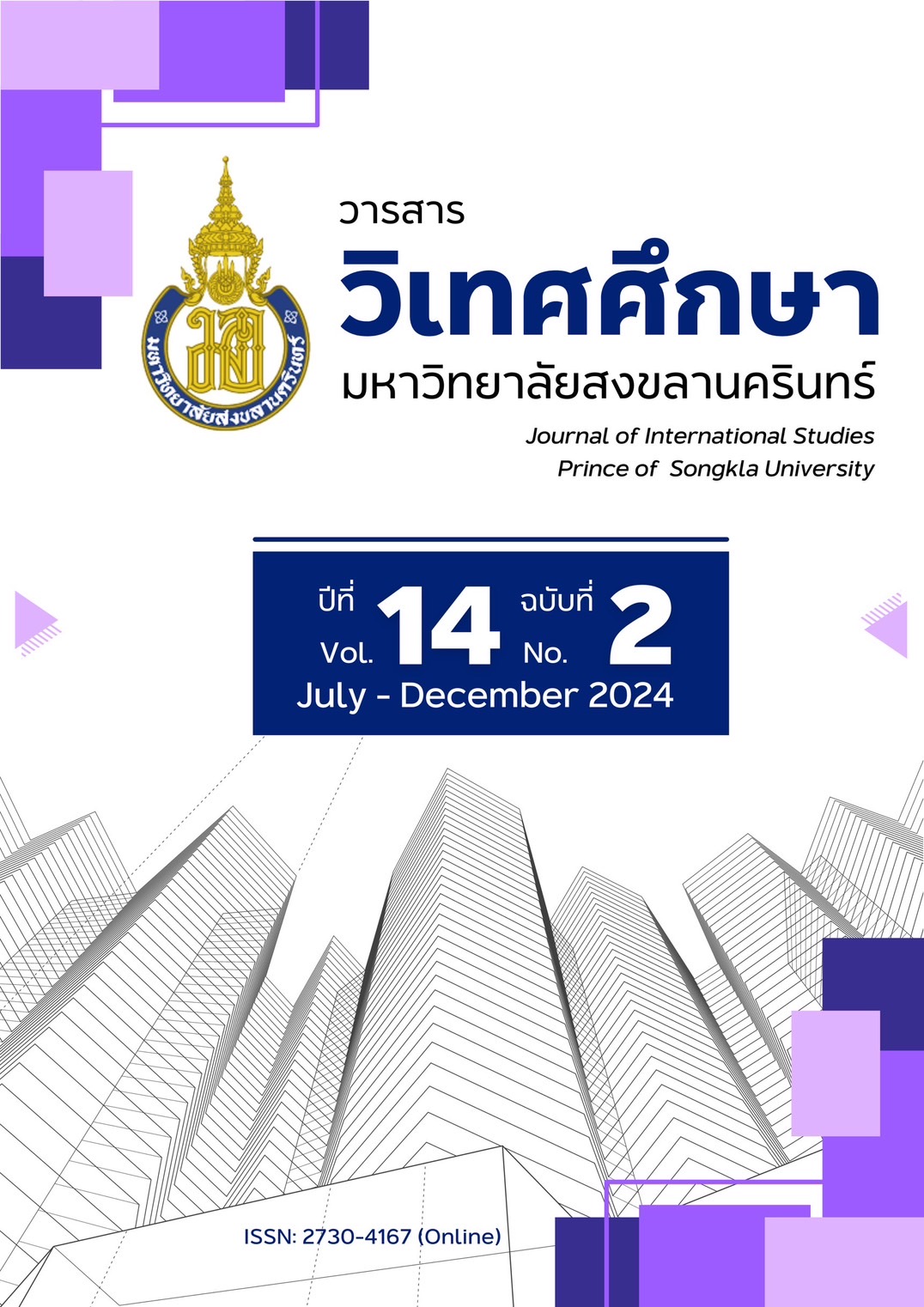Tourists’ Behavior and Expectations in Wellness Tourism: A Study of Phuket, Thailand
Main Article Content
Abstract
The objective of this research was to study behavior and expectations of Thai and foreign tourists in order to understand market demand and market potential of wellness tourism in Phuket, Thailand. The sample size was 434 Thai and foreign tourists. Convenience Sampling was used as a sampling technique in this study. The results of the study showed that destination quality, namely beach attractions, was the main factor influencing tourists’ choice of destination (23.92%). Most of the respondents were interested in experiencing food-related activities (28.10%). It was also found that the respondents had expectations, which created motivation for them to take into account the most nature-friendly and healthy for products and services. They also placed importance on destinations with good weather (x̄ = 4.43), followed by the desire to experience natural aesthetics (x̄ = 4.39).
Article Details

This work is licensed under a Creative Commons Attribution-NonCommercial-NoDerivatives 4.0 International License.
Statements and opinions expressed in articles herein are those of the authors and do not necessarily reflect the position of the editors or publisher.
Article, information, text, image, etc. which are published in Journal of International Studies, belong to Journal of International Studies. If anybody or any organization would like to use part or whole of them, they must receive written permission from Journal of International Studies before usage.
References
Angkulanon, R. (2018). Trend of Health Tourism in 'Chinese couples'. Bangkok Post https://www.thebangkokinsight.com/news/business/1789/
Bangkokbiznews. (2021). Medical Tourism. Bangkok Business News. https://www.bangkokbiznews.com/news/896568
Callaghan, S., Lösch, M., Pione, A., & Teichner, W. (2021). Feeling Good: The Future of the $1.5 Trillion Wellness Market. https://www.mckinsey.com/industries/consumer-packaged-goods/our-insights/feeling-good-the-future-of-the-1-5-trillion-wellness-market
Chen, J., Hsu, F.C., Yan, L., Lee, H.M., & Zhang, Y. (2023). Tourists’ Food Involvement, Place Attachment, and Destination Loyalty: The Moderating Role of Lifestyle. Behavioral Sciences, 13(8), 1-22. https://doi.org/10.3390/bs13080629
Chen, K., Liu, H., & Chang, F. (2013). Essential Customer Service Factors and the Segmentation of Older Visitors within Wellness Tourism Based on Hot Springs Hotels. International Journal of Hospitality Management, 35(1), 122-132.
Chuaysook, D., & Kovathanakul, D. (2015). Khonkaen Mice Industry Development towards Leading Mice City of Thailand. Journal of Thai Hospitality and Tourism, 10(1), 15-29.
Chunkajorn, P., & Na Thalang, C. (2021). Gastronomy Tourism Components and Service Marketing Mix Factors of Thai Tourists in Gastronomy Tourism to Thailand Riviera. Dusit Thani College Journal, 15(1), 66-82.
Chusri, W., & Lalitsasivimo, W. (2020). Health Tourisms: Thailand’s Competitiveness. Princess of Naradhiwas University Journal of Humanities and Social Sciences, 7(2), 205-226.
Cooper, D.R., & Schindler, P.S. (2001). Business Research Methods. London: McGraw-Hill Higher Education.
Dimitrovski, D., & Todorovic, A. (2015). Clustering Wellness Tourists in Spa Environment. Tourism Management Perspectives, 16, 259-265.
Future Market Insights. (2023). Thailand Culinary Tourism Market. https://www.futuremarketinsights.com/reports/thailand-culinary-tourism-market
Global Wellness Institute. (2017). Global Wellness Economy Monitor. https://globalwellnessinstitute.org/industry-research/
Global Wellness Summit. (2020). 2020 Global Wellness Trends, Wellness Music. https://www.globalwellnesssummit.com/2020-global-wellness-trends/wellness-music/
Hoang, S.D., Pham, T. P., & Tučková, Z. (2022). Tourist Motivation as an Antecedent of Destination and Ecotourism Loyalty. Emerging science journal, 6(5), 1114-1133.
Illera, J. (2022). Megatrends: Wellness – Mapping Key Opportunities in Asia Pacific. https://www.euromonitor.com/article/megatrends-wellness--mapping-key-opportunities-in-asia-pacific
Jyothis, T., & Jannardhanan, V. K. (2009). Service Quality in Health Tourism: An Evaluation of the Health Tourism Providers of Kerala (India). South Asian Journal of Tourism and Heritage, 2(1), 77-82.
Kasikorn Research Center. (2019). Medical-tourism expands to 2021. https://www.kasikornbank.com/th/persona
Kessler, D., Lee, J., & Whittingham, N. (2020). The Wellness Tourist Motivation Scale: A New Statistical Tool for Measuring Wellness Tourist Motivation. International Journal of Spa and Wellness, 3(1), 24-39.
Kieanwatana, K. (2018). Situations and Trends of World and Thailand Health Tourism. Journal of Cultural Approach, 19(37), 77-87.
Kieanwattana, K., Sukontasap, S., & Leemingsawat, V. (2021). Demand Situation and the Trend of Medical Tourism in Thailand. Academic Journal Institute of Physical Education, 10(1), 167-177.
Krajangchom, S., & Sangkakorn, K. (2019). Behaviours and Needs of Thai and Foreign Wellness Tourists in Upper North of Thailand. University of Thai Chamber of Commerce Journal Humanities and Social Sciences, 40(1), 57-76.
Kung, R.H. (2018). A Study of the Tourists Expectation, Satisfaction and Revisiting Intention in the Neiwan, Hsinchu. International Journal of New Developments in Engineering and Society, 2(1), 43-49.
Lehto, X.Y., Brown, S., Chen, Y., & Morrison, A.M. (2006). Yoga Tourism as a Niche within the Wellness Tourism Market. Tourism Recreation Research, 31(1), 25-35.
Lim, Y., Kim, H., & Lee, T. J. (2015). Visitor Motivational Factors and Level of Satisfaction in Wellness Tourism: Comparison Between First-term Visitor and Repeat Visitors. Asia Pacific Journal of Tourism Research, 21(2), 137-156.
Luekveerawattana, R. (2018). Key Factors Affecting of Tourists’ Decisions to Stay at Environmentally Friendly Hotels. Polish Journal of Management Studies, 17(2), 148-157.
Meng, F., & Xu, Y. (2012). Tourism Shopping Behavior: Planned, Impulsive, or Experiential?. International Journal of Culture, Tourism and Hospitality Research, 6(1), 250-265.
Mueller, H., & Kaufmann, E. L. (2001). Wellness Tourism: Market Analysis of a Special Health Tourism Segment and Implications for the Hotel Industry. Journal of Vacation Marketing, 7(1), 5-17.
Nikkei Asia. (2017). ANA to Offer Japan Medical Tourism Packages. https://asia.nikkei.com/Business/ANA-to-offer-Japan-medical-tourism-packages
Özdemir, C., & Yolal, M. (2017). Cross-Cultural Tourist Behavior: An Examination of Tourists' Behavior in Guided Tours. Tourism and Hospitality Research, 17(3), 1-11.
Padmasani. D., & Remya, V. (2015). Kerala: Health Tourism Hub for Ayurveda. International Journal of Social Sciences and Management, 2(1), 222-227.
Report of Bali Tourism. (2018). Report of Tourism and Related Business Models in Bali. https://www.sme.go.th/upload/mod_download/download-20181005064148.pdf
Šerić, M., Mikulić, J., & Došen, D. O. (2022). Understanding Prevention Measures and Tourist Behavior in Croatia during the COVID-19 Pandemic. A Mixed-Method Approach. Ekonomska Istrazivanja-Economic Research, 36(2), 1-24.
Tourism Authority of Thailand. (2020). Tourist Survey 2020. https://intelligencecenter.tat.or.th/articles/12311
Tourism Authority of Thailand. (2021). Thailand Will Implement Significant Relaxation of Covid-19 Measures for The Entry into The Kingdom of Thailand. https://www.tourismthailand.org/Articles/vaccine-certificate-en
Wongpratum, N., & Phumvitchuvet, D. (2021). The Health Tourism Management Model for Community Based on the King’s Philosophy. Journal of Arts Management, 5(2), 299-311.
Yu, L., Zhao, P., Tang, J., & Pang, L. (2022). Changes in Tourist Mobility after COVID-19 Outbreaks. Annals of Tourism Research, 98(1), 1-14.


